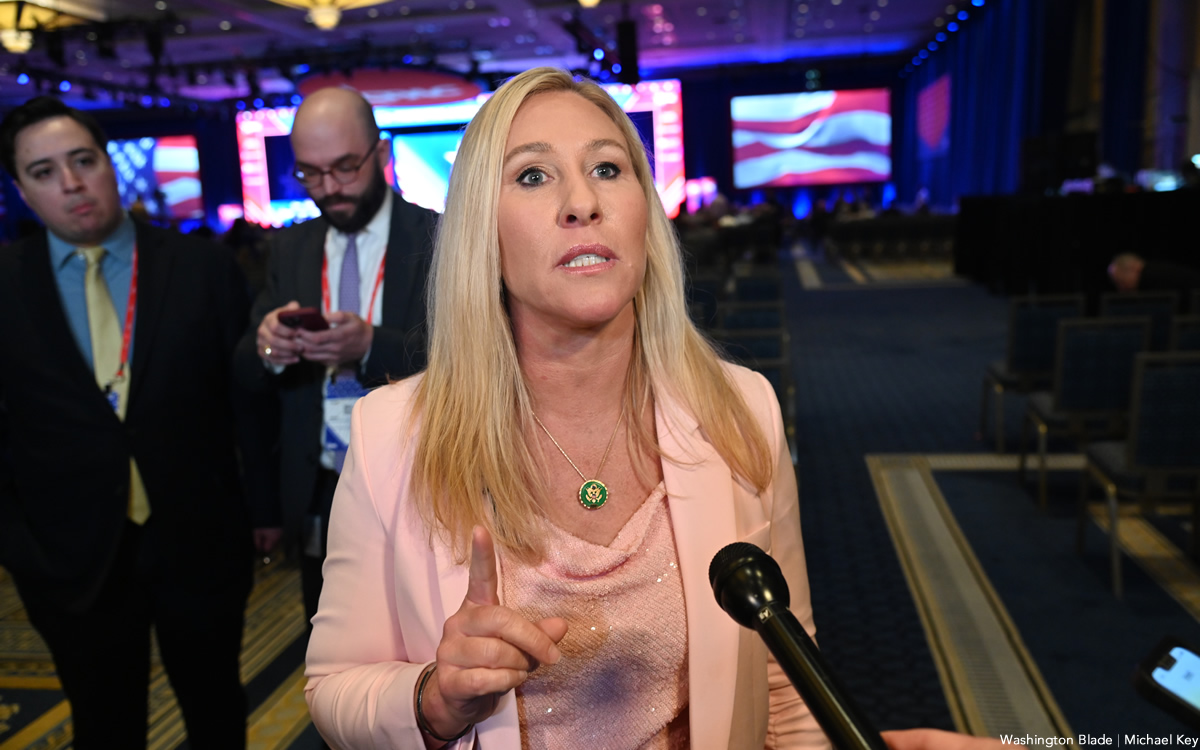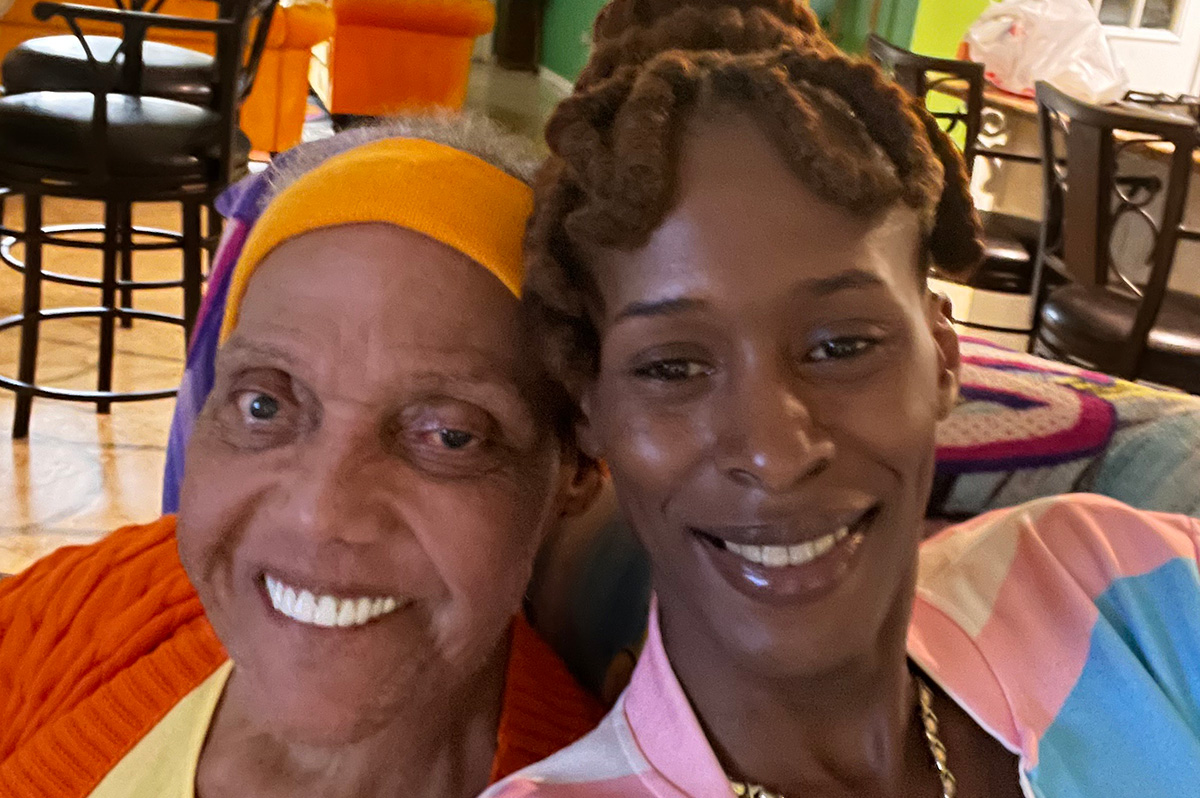Opinions
D.C.’s the gayest city of them all
But could you ever move to a red state?

I guess you can call this another part of my forever series on how much I loathe Republicans. And now, with Florida’s governor Ron DeSantis having signed the wicked “Don’t Say Gay” bill into law, I guess I just have some more to say on the matter.
But it looks like everyone, everywhere has more to say on the matter. It’s also got me thinking. Florida. Nice enough, sure. I love Key West. I’ve had fun in Fort Lauderdale. I’ve even been to Gay Days at Disney, but that was a while ago. And sure I’ll go back to vacation, barring any further anti-gay laws I suppose. But could I ever move to a red state? You know, pack everything up and relocate? I don’t know.
There was a graph circulating on social media this week from the Williams Institute, a UCLA public policy think tank specializing in sexuality and gender. The graph showed social acceptance of LGB people (note this graph did not include the T) by state, including D.C. Bringing up the bottom, well below the national average, were your bastions of rightwing thought and deserts of dentistry West Virginia, Oklahoma, and Mississippi. You could probably guess the top tier, too — Vermont, Hawaii, Massachusetts. But sitting far ahead of even those was our little D.C. We were, like, way ahead. We’re the gayest city out there. Granted, being a sort of city-state without any benefits of an actual state (column for another time), we sit alone in many ways. And if you plucked out New York City, San Francisco, and even New Orleans or Houston, the race for the top spot in the graph of gay might be a bit tighter.
So, in short, why live anywhere else? If not D.C. or New York, why would you bother with a state like Florida? Granted, politics aren’t forever, and they do have some low taxes. But lord, right now, they just don’t even want to talk about you, there in Florida and other similarly hot places. Even Texas and their closet-case of a Lieutenant Governor Dan Patrick is promising similar legislation in the Lone Star State. So, could you ever really live there? And if you ask me these rightwing fever dreams don’t show signs of breaking anytime soon.
On this topic, Eric Adams, the newish, bold and brash mayor of New York openly pleaded with gays and lesbians to leave Florida. The mayor’s office has even purchased digital billboard ads in Florida markets encouraging folks move and “come to the city where you can say whatever you want,” that in direct reference to the “Don’t Say Gay” bill. He added at a news conference that this “political showmanship of attempting to demonize a particular group or community is unacceptable.” He went on to say that, “we are going to loudly show our support and say to those who are living in Florida: ‘We want you here in New York.’”
We’ve long been a political football. Some of us, maybe even including me, thought that after marriage equality and enough cousins coming to gay weddings, this would have subsided somewhat. And in some way it has.
But the fringe right will always find new bows and ribbons to wrap us all up in some new version of threatening. Remember, that graph I described above did not include the “T” in LGBT. They seem to be the target at present. But as I sit at my desk and finish up this column, in comfortable Adams Morgan, where I’m a mere 1,000 feet from three gay bars, I wonder if I have it too good. But I also wonder, if you’re tired of being kicked around, why not land somewhere else and have it too good for once.
Brock Thompson is a D.C.-based writer. He contributes regularly to the Blade.
Opinions
MTG should keep up the pressure on Trump, MAGA
Unexpected flip a welcome sign of GOP resistance

If the first time you ever saw, or heard, Rep. Marjorie Taylor Greene (R-Ga.), was when she appeared on “The View,” you could be forgiven if you thought what an intelligent, rational, woman she is. If it wasn’t the first time you saw her, you just wondered what happened to the wacko you thought you knew.
Marjorie Taylor Greene has stood up for the women who were the victims of Jeffrey Epstein and his friends. She was one of the 218 who signed on to bring the bill to release the files to a vote in the House. I think the vote will be more lopsided than people think, getting many more Republicans. After it passes the House, it will go to the Senate, and if it passes there, to the felon, for him to decide — will he sign it or veto it?
Greene has also spoken out and criticized the Republican Party for not agreeing to extend the tax credits for the ACA, to ensure the cost of insurance premiums remain at least affordable for most. Again, we all had to wonder what happened to the real MTG, the non-repentant Trumper. This version of Greene has driven the president to an apoplectic state. He has given her a new nickname, and accused her of betraying the entire Republican Party. These are quotes from Trump on social media last Saturday: He called her the “Lightweight Congresswoman Marjorie Taylor Brown (Green grass turns brown when it begins to ROT!),” based on what she said. He accused her of turning left, and according to him “performed poorly on the pathetic View, and became the RINO that we all know she always was. Just another fake politician, no different than Rand Paul Jr. (Thomas Massie), who got caught being a full-fledged Republican In Name Only (RINO)! MAKE AMERICA GREAT AGAIN!!!.”
Although I support what Greene is saying on these two issues we shouldn’t forget Greene is the woman who said, “joining the military is “ like throwing your life away” while discussing the U.S. withdrawal from Afghanistan on Fox News. She also said regarding two July 4th incidents in which seven people were fatally shot at an Independence Day parade in Highland Park, Illinois, and two police officers were gunned down in Philadelphia, “Two shootings on July 4: One in a rich white neighborhood and the other at a fireworks display. It almost sounds like it’s designed to persuade Republicans to go along with more gun control.” Then when talking about the Jan. 6, 2021, attack on the Capitol, in which hundreds of Trump supporters stormed the building to stop certification of the presidential election results, she called it “a little riot.” Very bizarre. We are all definitely living in Trump’s alternate universe.
I think the thing that bothers the felon the most is Greene’s insistence the Epstein files be released. It is interesting there is nothing yet public that implicates Trump in actively participating in any pedophilia with Epstein. Some of the released emails do implicate him in knowing what Epstein was doing, but not speaking out about it. But what is making the felon in the White House apparently hysterical, and fighting so hard, to keep the Epstein files from the public? What does he know is in them, that we don’t? He has tried every distraction to move this off the front-page including bombing Venezuelan ships he claims are carrying drugs, without any proof, and threatening a land war against Venezuela. Since that hasn’t worked, he is having his AG, his lapdog, Pam Bondi, have a prosecutor look at only what Democrats could be involved in the Epstein scandal, clearly hoping if there is an active investigation it could keep the files away from the public, possibly for years.
Because of the recent election results, the felon is backtracking on the tariffs he said were so important, and a huge positive, for the United States. Those results clearly showed the people are blaming him, and the Republican Party, for the rising prices. Even to a clueless, evil, human being like him, it has become clear the tariffs are making life worse for the American people.
So, I say to Marjorie Taylor Greene: Stay this new course you are on. Keep up the work attacking the felon, and Republicans who are going along with him. Know that even those of us who think you are a wacko, thank you.
Peter Rosenstein is a longtime LGBTQ rights and Democratic Party activist.
Opinions
Community must honor all trans people on Transgender Day of Remembrance
Trans people more likely to be disabled, face bias within medical systems.

Our community has let marginalized people down. That’s the simple truth we need to hold on this Transgender Day of Remembrance. And, believe me, I don’t say this to accuse anyone. But marginalized trans people — including BIPOC, disabled and neurodivergent people, refugees and asylum seekers — are disproportionately affected by transphobic violence that too often goes unchecked, unreported, and unchallenged. And the wider LGBTQ community hasn’t done nearly enough to change this.
From the very beginning, Transgender Day of Remembrance was about marginalized trans lives.
In 1999, transgender activists Gwendolyn Ann Smith, Nancy Nangeroni, and Jahaira DeAlto founded TDoR a year after the killing of Rita Hester, a Black trans woman, to honor her memory and the memory of all trans people lost to hate-motivated violence. Hester was openly trans, courageous, and ready to speak up against transphobia. Her death was noticed, but not all marginalized trans people are so lucky.
Now, as I prepare a speech for my city’s TDoR vigil — a speech about intersectionality, because I’m a trans, autistic, ADHDer refugee from a mixed background — I’m not even sure where to begin. You could write entire books and academic studies, hundreds of pages, about why and how marginalized trans people are under attack. But none of that fully captures how deeply normalized these risks have become in our daily lives.
We trans people living at multiple intersections have become targets of jokes about the “woke agenda.” If characters like us appear in mass culture, countless people try to convince the world that we can’t be real. When a celebrity like us exists, they’re treated as a curiosity. And meanwhile, the very real violence against people like us goes unnoticed.
It is known that trans adults are more likely to be disabled than cisgender adults, in part because of the failures and biases within medical systems. We also know there is a significant overlap between trans identity and autism for reasons we don’t yet fully understand. But what we do understand is this: disabled trans people and autistic trans people are often denied autonomy, recognition, and basic respect. Worse, we face a bigger risk of violence and hate crime.
And in the context of the modern U.S., this danger is multiplied.
The country is experiencing the largest coordinated wave of anti-trans legislation in its history: hundreds of bills targeting every aspect of trans existence, from healthcare to public spaces. At the same time, the immigration system has become increasingly hostile. When the government targets both trans communities and refugees, trans refugees end up trapped in the gap between two systems that refuse to take responsibility for protecting them.
For many trans refugees, especially autistic and disabled ones, the greatest danger starts not when they are deported, but the moment they enter the U.S. immigration system. U.S. Immigration and Customs Enforcement detention is notoriously unsafe for trans people, particularly trans women who are often placed in men’s facilities, denied hormones, subjected to harassment, or put in solitary confinement under the excuse of “protection.” ICE excluded trans statistics from its public reports, trying to erase trans people on a systematic level, to make this discrimination invisible.
For autistic trans women, the sensory overload of detention — the noise, the lights, the shouting, the unpredictability — can be unbearable. ICE facilities almost never have staff trained in autism, mental health, disability communication, or even basic general and cultural competency. Many autistic trans refugees simply cannot navigate complaint procedures, medical requests, or legal paperwork without support that does not exist inside the system.
The problems don’t stop after release.
The U.S. asylum process demands documentation and formal proof of persecution that many refugees, especially autistic people, people with mental health issues or learning disabilities simply do not have. The violence they experience is often undocumented precisely because they were trans, because they were autistic, or because the police in their countries refused to recognize them. Immigration judges frequently misinterpret autistic communication as “inconsistency,” or dismiss their stories because they express trauma differently. For Black and brown trans refugees, the credibility gap is even wider.
And where are they supposed to turn for help? To refugee organizations that often have no training in trans issues, no understanding of gender-affirming care, and no knowledge of hate-crime risks? Or to LGBTQ groups, which may be strong advocates but rarely have immigration lawyers, disability-trained staff, autistic-friendly politics or experience dealing with ICE? What does a trans refugee woman do if she is also autistic and struggles with bureaucracy, communication, or social interactions? Who takes her seriously? Where does she go to report violence when the police misgender her, the immigration office overlooks her, and the community organizations don’t have the tools to protect her?
Let’s not forget that autistic people are also under attack in the current American political climate.
Disability rights — including the right to live independently, the right to healthcare, and the right to refuse institutionalization — are being eroded. Studies suggest that up to 90 percent of autistic women experience some form of abuse or violence in their lifetimes. Can you imagine the data for trans women? Or men, or nonbinary people? Combine that with transphobia, racism, xenophobia, and the fragility of the asylum system, and you create a situation where a trans autistic refugee is left almost completely unprotected.
As a trans autistic person who has worked with trans communities, autistic communities, and refugees for over 11 years, I can say with absolute clarity: you cannot separate one form of discrimination from another. Institutions don’t know how to handle cases at the intersection. Even in the best-case scenarios, in the “best” countries, police, and social services struggle to understand the needs of someone who is trans, autistic, disabled or mentally ill, racialized, and displaced. From Ukraine to Russia, from the UK to the U.S. — in every place I have lived or worked — LGBTQ organizations still lack a proper strategy for protecting trans people who live at these intersections.
And until we confront this honestly, until we build structures that acknowledge the reality of those who are hit hardest, Transgender Day of Remembrance will continue to mourn the same people we keep failing to protect. Or worse, the death of the most vulnerable victims of transphobia would still go unnoticed and undocumented.
Commentary
Miss Major Griffin-Gracy paved the way for today’s transgender rights revolution
The annual Transgender Day of Remembrance is Nov. 20

I’ll never forget the moment Miss Major Griffin-Gracy looked me in the eye and said, “Baby, you can’t wait for permission to exist. You take up space because you deserve to be here.” It was 2016, and I had just finished interviewing her at Northeastern University. What began as a professional encounter became something far deeper. She welcomed me into her chosen family with the fierce love that defined her life’s work.
That advice didn’t just change my perspective; it changed my life. Miss Major had an extraordinary ability to see potential in people before they saw it themselves. She offered guidance that gave permission to dream bigger, fight harder, and live unapologetically in a world that often told transgender people we didn’t belong.
Today, as we reflect on her legacy, we must remember that Miss Major didn’t simply join the transgender rights movement. She helped create it. Her activism laid the foundation for every victory we celebrate today and continues to shape how we fight for justice, dignity, and equality.
To understand her impact, we return to June 28, 1969, when a 27-year-old Black transgender woman stood her ground at the Stonewall Inn. While history often overlooks the transgender women of color at the heart of that uprising, Miss Major was there, refusing to back down when police raided the bar that night.
After Stonewall, she dedicated her life to building what became the infrastructure of liberation. When she fought that night, she wasn’t only resisting police brutality, she was declaring that transgender people, especially Black trans women, would no longer be invisible. Her message was simple: We exist. We matter. We’re not going anywhere.
Miss Major coupled courage with care. She knew that real change required systems of support. While many focused on changing laws, she focused on changing lives. Her work with incarcerated transgender women stands as one of her most powerful legacies. She visited prisons, wrote letters, sent commissary money, and made sure these women knew they weren’t forgotten. It wasn’t glamorous work, but it was transformative.
She built a model of organizing rooted in love and mutual aid communities supporting each other while demanding structural change. That approach became the blueprint for today’s transgender rights organizations, especially those centering Black trans women.
In a time when invisibility was often the safest choice, Miss Major chose visibility. She shared her story again and again, using her own life as proof of transgender resilience and humanity. Her openness created connection and understanding. People who heard her speak couldn’t ignore the truth of our existence or the strength it takes to live authentically.
Miss Major also believed leadership meant creating space for others. After our first meeting, she connected me with other activists, shared resources, and reminded me that my voice mattered. Talk to any transgender activist who came up in the last two decades, and you’ll hear a similar story. She saw something in others and nurtured it until it bloomed.
Her fingerprints are everywhere in today’s movement: in grassroots organizing, in the centering of the most marginalized voices, and in the insistence that liberation must be rooted in love and community. The victories we see (from healthcare access to broader public recognition) are built on the foundation she laid.
In one of our last conversations, Miss Major told me, “This movement isn’t about me. It’s about all of us. And it’s about the ones who come after us.” Her life reminds us that movements are sustained by love as much as protest, by the daily act of showing up for one another as much as by the marches and rallies.
As anti-trans violence rises and our rights face relentless attacks, we need Miss Major’s example more than ever. We need her fierce love, her unwavering defiance, and her belief that we deserve to take up space. Her legacy reminds us that the fight for our lives is also the fight for our joy.
This Transgender Day of Remembrance, we honor those we’ve lost and celebrate those who dared to live fully, people like Miss Major, who taught us that remembrance must come with responsibility. Her life calls us to protect one another, to build systems of care, and to keep fighting for a world where every trans person can live safely and proudly.
The mother of our movement may be gone, but the family she built lives on. The best way to honor her is to continue her work: to build, to protect, to love without limits, and to remind every trans person that they belong, they matter, and they are loved.

Chastity Bowick is an award-winning activist, civil rights leader, and transgender health advocate who has dedicated her career to empowering transgender and gender-nonconforming communities. She led the Transgender Emergency Fund of Massachusetts for seven years, opening New England’s first trans transitional home, and now heads Chastity’s Consulting & Talent Group, LLC. In 2025, she became Interim Executive Director of the Marsha P. Johnson Institute, continuing her mission to advance equity, safety, and opportunity for trans people. Her leadership has earned her numerous honors recognizing her impact on social justice and community care.
-

 District of Columbia2 days ago
District of Columbia2 days agoD.C. LGBTQ bars ‘hanging in there’ amid tough economy
-

 District of Columbia9 hours ago
District of Columbia9 hours agoNew LGBTQ bar Rush set to debut this weekend
-

 National2 days ago
National2 days ago213 House members ask Speaker Johnson to condemn anti-trans rhetoric
-

 Chile3 days ago
Chile3 days agoChilean presidential election outcome to determine future of LGBTQ rights in country















